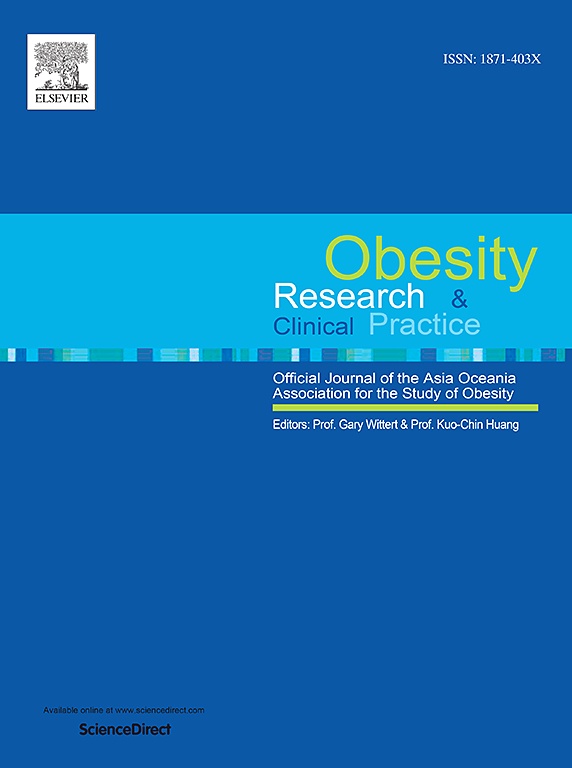Impact of body mass index on recurrent stroke in stroke survivors: An updated systematic review and meta-analysis
IF 2.5
4区 医学
Q3 ENDOCRINOLOGY & METABOLISM
引用次数: 0
Abstract
Background
This updated systematic review and meta-analysis aimed to re-evaluate the potential impact of body mass index (BMI) on the risk of recurrent stroke among stroke survivors.
Methods
We systematically searched PubMed, EMBASE, and Cochrane CENTRAL databases for studies published up to January 20, 2025. Eligible studies included randomized controlled trials, cohort studies, or case-control studies enrolling adult stroke or transient ischemic attack (TIA) survivors, with at least one year of follow-up, and reporting stroke recurrence by BMI categories. Studies were required to define stroke using clinical diagnosis or the International Classification of Disease (ICD) codes, and to categorize BMI using the World Health Organization (WHO) or Asia-Pacific classifications. The primary outcome was recurrent stroke risk between individuals with and without obesity, assessed using risk ratios (RRs). Secondary outcomes evaluated recurrent stroke risk across WHO BMI categories using adjusted hazard ratios (HRs). (PROSPERO: CRD42024580168)
Results
Fourteen studies (136,581 subjects) were included in the qualitative review (systematic review). Two using Asia-Pacific criteria were excluded, leaving 12 studies using WHO-classified BMI for quantitative synthesis (meta-analysis). Meta-analysis showed no significant difference in stroke recurrence between individuals with and without obesity (RR = 0.89, 95 % CI: 0.71–1.13). Meta-analysis of adjusted HRs showed no significant difference in stroke recurrence risk for individuals with underweight or overweight compared to those with normal weight. However, in the subgroup with ≥ 3 years follow-up, overweight was significantly associated with lower recurrent stroke risk (HR = 0.91). Also, individuals with obesity had a significantly lower stroke recurrence risk than normal weight individuals (HR = 0.85), particularly among those aged ≥ 65 years (HR = 0.82).
Conclusions
Overweight and obesity may be associated with a lower risk of stroke recurrence, particularly in older adults and during long-term follow-up (≥ 3 years). These findings suggest a potential obesity paradox in stroke survivors, warranting further investigations.
身体质量指数对卒中幸存者复发性卒中的影响:一项最新的系统综述和荟萃分析。
背景:这项更新的系统综述和荟萃分析旨在重新评估身体质量指数(BMI)对卒中幸存者卒中复发风险的潜在影响。方法:我们系统地检索PubMed、EMBASE和Cochrane CENTRAL数据库,检索截至2025年1月20日发表的研究。符合条件的研究包括随机对照试验、队列研究或纳入成年卒中或短暂性脑缺血发作(TIA)幸存者的病例对照研究,随访至少一年,并按BMI分类报告卒中复发情况。研究需要使用临床诊断或国际疾病分类(ICD)代码来定义中风,并使用世界卫生组织(WHO)或亚太分类对BMI进行分类。主要终点是肥胖和非肥胖个体之间卒中复发风险,使用风险比(rr)进行评估。次要结局采用调整后的危险比(hr)评估WHO BMI分类中卒中复发风险。(PROSPERO: CRD42024580168)结果:14项研究(136,581名受试者)纳入定性评价(系统评价)。排除了两项使用亚太标准的研究,剩下12项使用who分类BMI进行定量综合(荟萃分析)的研究。荟萃分析显示,卒中复发率在肥胖者和非肥胖者之间无显著差异(RR = 0.89, 95 % CI: 0.71-1.13)。调整后的hr荟萃分析显示,体重过轻或超重的人与体重正常的人相比,卒中复发风险无显著差异。然而,在随访≥ 3年的亚组中,超重与卒中复发风险降低显著相关(HR = 0.91)。此外,肥胖个体的卒中复发风险显著低于正常体重个体(HR = 0.85),尤其是年龄≥ 65岁的人群(HR = 0.82)。结论:超重和肥胖可能与卒中复发风险降低有关,特别是在老年人和长期随访期间(≥3年)。这些发现表明中风幸存者中存在潜在的肥胖悖论,值得进一步调查。
本文章由计算机程序翻译,如有差异,请以英文原文为准。
求助全文
约1分钟内获得全文
求助全文
来源期刊

Obesity research & clinical practice
医学-内分泌学与代谢
CiteScore
7.10
自引率
0.00%
发文量
80
审稿时长
49 days
期刊介绍:
The aim of Obesity Research & Clinical Practice (ORCP) is to publish high quality clinical and basic research relating to the epidemiology, mechanism, complications and treatment of obesity and the complication of obesity. Studies relating to the Asia Oceania region are particularly welcome, given the increasing burden of obesity in Asia Pacific, compounded by specific regional population-based and genetic issues, and the devastating personal and economic consequences. The journal aims to expose health care practitioners, clinical researchers, basic scientists, epidemiologists, and public health officials in the region to all areas of obesity research and practice. In addition to original research the ORCP publishes reviews, patient reports, short communications, and letters to the editor (including comments on published papers). The proceedings and abstracts of the Annual Meeting of the Asia Oceania Association for the Study of Obesity is published as a supplement each year.
 求助内容:
求助内容: 应助结果提醒方式:
应助结果提醒方式:


